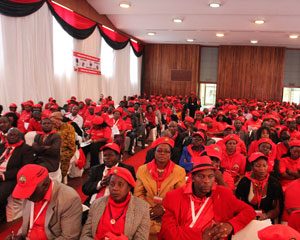
Ever since the heavy thumping of the MDC-T in the July 2013 harmonised elections, its leaders have cried foul and came up with at times, hugely creative and dramatic reasons on why the party lost.
Sunday View with Peacemaker Zano
The blame was squarely put on Zanu PF’s shoulders as if winning an election is now a crime.
MDC-T leader, Morgan Tsvangirai made sensational claims of vote rigging but failed to provide a single iota of evidence to prove their case.
Contrary to Tsvangirai’s claims of election rigging, the unvarnished truth is that MDC-T lost the elections as a result of confused party ideologies, intra-party power struggles and the moral decadence of its leaders among other reasons that cannot be exhausted in this article.
Simply put, even after 15 years in existence, MDC-T is still politically immature.
To start with, the MDC-T deviated from its original mandate that had drawn the people’s support and sympathy. Its founding principles were anchored on workers’ interests.
Initially the MDC-T claimed to be a cluster of radical forces which included Zimbabwe Congress of Trade Unions (ZCTU), National Constitutional Assembly (NCA), and a broad-based coalition of churches, Women’s groups like Women Of Zimbabwe Arise (Woza), Students’ Union groups like Zinasu, and civil society organisations.
- Chamisa under fire over US$120K donation
- Mavhunga puts DeMbare into Chibuku quarterfinals
- Pension funds bet on Cabora Bassa oilfields
- Councils defy govt fire tender directive
Keep Reading
Upon inception of the inclusive government which started on February 11 2009, when the MDC-T leader Tsvangirai, was sworn-in as Prime Minister the party lost touch with realities that kept them in tandem with labour concerns as its critical partners in the movement.
Throughout the full life cycle of the MDC-T government officials failed to use their influence to ensure that labour demands were met. Civil servants did not get better salaries and they continued to languish in poverty with salaries that fell far below the poverty datum line. Their conditions of service remained pathetic as well.
What made the situation fatal for the MDC-T is that they headed the Finance and Labour ministries. Another blow to MDC-T was the continued existence of the illegal sanctions imposed on Zimbabwe that curtailed economic development.
Tsvangirai’s promise to turn around the economy in 90 days if he got into government did not come to pass.
When the elections came in 2013, MDC-T party leaders failed to fully articulate the party’s election manifesto, which hinged on — Jobs, Upliftment, Investment, Capital and the Environment (Juice). They appeared confounded by the complex concept and this confusion trickled down to their supporters effectively rendering them unconvincing come election time.
Furthermore, the party expounded unrealistic populist policies that did not meet with the party’s desires of winning the election.
Poor campaigning strategies is also another contributing factor in the party’s poor performance.
While Zanu PF was busy going door-to-door canvassing for support and making sure its supporters were registered, the faceless Facebook character, “Baba Jukwa” misled MDC-T and its supporters by giving them a false sense of election security and victory.
Tsvangirai and his cohorts left Baba Jukwa to campaign for them on social media while they were busy accumulating wealth and pursuing personal interests. This exposed MDC-T’s insensitivity to the wishes of the people, paving way for Zanu PF to work extra hard in mass mobilisation before elections, leading to its resounding victory.
MDC-T party leaders are wholly answerable for making the fundamental blunders that resulted in their embarrassing loss in the 2013 elections.











